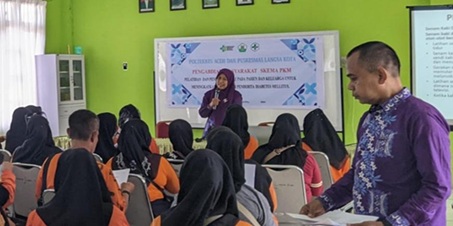Pelatihan dan Penerapan Diabetes Self Management Education pada Pasien dan Keluarga untuk Meningkatkan Efikasi Diri Penderita Diabetes Mellitus Training and Implementation of Diabetes Self Management Education for Patients and Families to Increase Self-Efficacy of Patients with Diabetes Mellitus
Main Article Content
Abstract
Diabetes Mellitus is one of the chronic diseases and every year the number of sufferers is increasing in various parts of the world. This disease is a metabolic disorder in which the body is impaired in using glucose, protein, and fat due to insulin deficiency or insulin resistance. There are 422,000,000 people worldwide suffering from diabetes mellitus, mostly in low- and middle-income countries and about 1,600,000 deaths are associated with diabetes mellitus every year. This service aims to increase the knowledge, insight, and independence of patients in implementing Diabetes Self Management Education with the family to increase the self-efficacy of patients with diabetes mellitus. The method of this community service is training by providing Diabetes Self Management Education material to be applied in the patient's daily life. Participants are patients with diabetes mellitus and the closest family as patient companions, which was carried out at the Langsa Kota Health Center on May 29 - June 12, 2024. The results of this service were obtained before the intervention the majority of participants had moderate knowledge (78%) and after the intervention the majority had good knowledge (89.1%), there was also an increase in self-efficacy from before the intervention the majority was moderate (64%) after the intervention, the level of self-efficacy of the participants increased with a high majority (78.3%). It is recommended that health facilities apply diabetes self-management education to diabetics because if diabetics understand this self-management, they can manage their health wisely and increase self-efficacy.
Downloads
Article Details

This work is licensed under a Creative Commons Attribution-ShareAlike 4.0 International License.
Authors who publish with this journal agree to the following terms:
- Any article on the copyright is retained by the author(s).
- Author grant the journal, right of first publication with the work simultaneously licensed under a Creative Commons Attribution License that allows others to share work with acknowledgment of the work authors and initial publications in this journal.
- Authors are able to enter into a separate, additional contractual arrangements for non-exclusive distribution of published articles of work (eg, post-institutional repository) or publish it in a book, with acknowledgment of its initial publication in this journal.
- Authors are permitted and encouraged to post their work online (e.g., in institutional repositories or on their websites) prior to and during the submission process, as can lead to productive exchanges, as well as earlier and greater citation of published work.
- The article and any associated published material is distributed under the Creative Commons Attribution-ShareAlike 4.0 International License
References
Alligood, M. R. (2017). Nursing Theorists and Their Work-E-Book: Nursing Theorists and Their Work-E-Book. Elsevier Health Sciences. https://www.scirp.org/reference/referencespapers?referenceid=3538713
Chrvala, C. A., Sherr, D., & Lipman, R. D. (2016). Diabetes self-management education for adults with type 2 diabetes mellitus: a systematic review of the effect on glycemic control. Patient Education and Counseling, 99(6), 926–943. https://doi.org/10.1016/j.pec.2015.11.003
Dunning, T. (2014). Care of People with Diabetes: A Manual of Nursing Practice. Australia: Victoria. https://doi.org/10.1002/9780470774649
GedeNgurah, I. G. K., & Sukmayanti, M. (2011). Efikasi diri pada pasien diabetes mellitus tipe 2. Arnike, Doyarnike, Doya, 21, 16. https://poltekkes-denpasar.ac.id/files/JURNAL%20GEMA%20KEPERAWATAN/DESEMBER%202014/ARTIKEL%20I%20Gusti%20Ketut%20GedeNgurah%20dkk,.pdf
Hati, Y. (2014). Efektifitas Edukasi Diabetes Terpadu untuk Meningkatkan Efikasi Diri Pasien Diabetes Mellitus Tipe 2. Universitas Sumatera Utara. https://repositori.usu.ac.id/handle/123456789/33276
Himawan, I. W., Pulungan, A. B., Tridjaja, B., & Batubara, J. R. L. (2016). Komplikasi jangka pendek dan jangka panjang diabetes mellitus tipe 1. Sari Pediatri, 10(6), 367–372. https://dx.doi.org/10.14238/sp10.6.2009.367-72
Indrayana, S., & others. (2016). Pengaruh Diabetes Self Management Education And Support (Dsme/S) Terhadap Efikasi Diri Klien Diabetes Melitus (DM) Tipe 2 Di Wilayah Kerja Puskesmas Patrang Kabupaten Jember. http://repository.unej.ac.id/handle/123456789/76923
Liputan6.com. (2019). Indonesia, Peringkat ke-6 Penderita Diabetes Terbanyak di Dunia. Https://Www.Liputan6.Com/Health/Read/3949563/Indonesia-Peringkat-Ke-6-Penderita-Diabetes-Terbanyak-Di-Dunia Diakses 02 Februari 2024.
Maddux, J. E. (2016). Self-efficacy. In Interpersonal and intrapersonal expectancies (pp. 41–46). Routledge. https://psycnet.apa.org/doi/10.4324/9781315652535-5
Mirza, R. (2017). Memaksimalkan dukungan keluarga guna meningkatkan kualitas hidup pasien diabetes mellitus. JUMANTIK (Jurnal Ilmiah Penelitian Kesehatan), 2(2), 12–30. http://dx.doi.org/10.30829/jumantik.v2i2.1122
Nurjannah, A. (2022). Pengaruh Diabetes Self Management Education (DSME) Melalui Whatsapp di Masa Pandemi COVID-19 terhadap Self Care Pasien DM Tipe 2 di Puskesmas Seyegan. Poltekkes Kemenkes Yogyakarta. http://eprints.poltekkesjogja.ac.id/8178/
Perkeni. (2015). Pengelolaan dan pencegahan diabetes melitus tipe 2 di Indonesia. Pb. Perkeni, Volume 6. Jakarta.
Rahman, M. T. (2020). Filsafat ilmu pengetahuan. Prodi S2 Studi Agama-Agama UIN Sunan Gunung Djati Bandung. https://www.researchgate.net/publication/357157825_Filsafat_Ilmu_Pengetahuan
Setyoningrum, R., Winahyu, K. M., & Badawi, A. (2016). Hubungan Antara Motivasi Dengan Efikasi Diri Pada Pasien Diabetes Melitus Tipe 2 Di Puskesmas Batuceper Kota Tangerang. Jkft. https://jurnal.umt.ac.id/index.php/jkft/article/viewFile/64/953
Sulistyowati, D., Aty, Y. M. V. B., & Gatum, A. M. (2020). Hubungan self efficacy dengan perilaku self care (dengan pendekatan teori Orem) pasien stroke di poli saraf RSUD Prof. Dr. WZ Johannes Kupang. CHMK Applied Scientific Journal, 3(3), 70–75. https://cyber-chmk.net/ojs/index.php/sains/article/view/815
Sutedjo, A. Y. (2016). 5 Strategi Penderita Diabetes Melitus Berusia Panjang. PT Kanisius. http://repo.upertis.ac.id/99/
Widyanata, K. A. J., & others. (2018). Penerapan Kalender DM Berbasis Aplikasi Android Sebagai Media DSME (Diabetes Self Management Education) Terhadap Self Efficacy Dan Kadar HbA1c Pada Pasien Diabetes Mellitus Tipe 2. Universitas Airlangga. https://repository.unair.ac.id/78293/2/TKP%2086_18%20Wid%20p.pdf
World Health Organization. (2024). Diabetes. WHO Website. https://www.who.int/health-topics/diabetes#tab=tab_1
